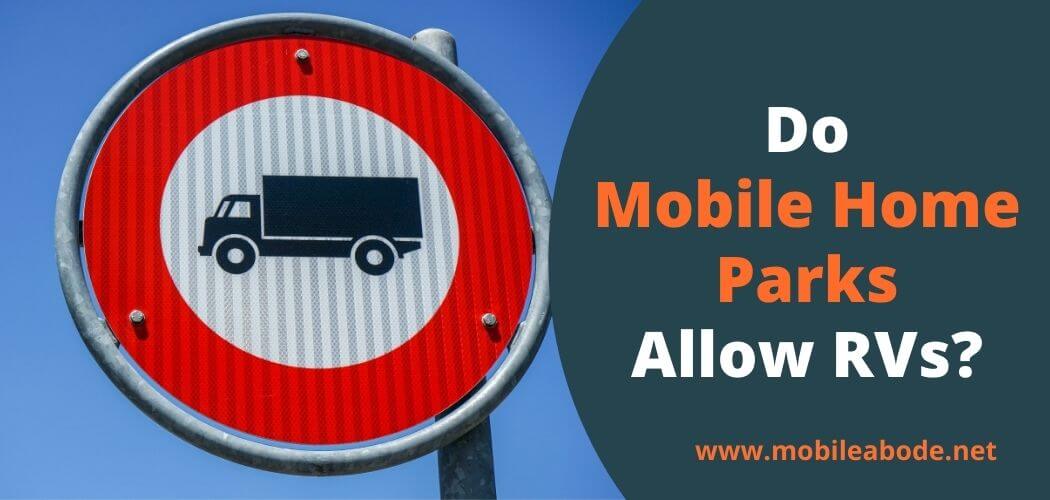Mobile home parks are a great option for those looking to own their affordable housing. But do mobile home parks allow RVs? Let’s take a look at the answer.
Some mobile home parks will allow RV parking, but not all of them. It depends on what particular park you’re looking into and if they have the space available or not.
The best way to find out if your potential property allows RVs is by contacting the county zoning board or other official body that deals with such laws in your area.
This blog post will go over what these restrictions entail and provide links to help you determine if an RV would be allowed at your potential property before purchasing it.
Related Article: What Is A Gaucho Bed For An RV Or Camper?
Do Mobile Home Parks Allow RVs?
The quick answer is that some mobile home parks allow RV parking, but not all of them. It depends on what particular park you’re looking into and if they have the space available or not.
As one might expect there are certain rules and regulations involved with how RVs can be used in a mobile home park. These restrictions vary by county, city, state etc.
So you need to review these laws before heading out to your potential property.
We’ve provided details below to help you determine if an RV would be allowed at your future property without having to contact each city or county office.
What are the laws that may apply?
Here are some examples followed by links that will take you directly to their full guidelines.
- You can have an RV in a mobile home park, but it has to be listed by the county/city as an “RV”
- An RV is allowed if it’s hooked up to electricity and water
- RVs are allowed in mobile home parks only during camping season (a few months out of the year)
- Minimum lot size requirement is larger for all types of homes when counting total square footage, RV’s included
- Being in possession of an RV doesn’t automatically exclude you from being approved for a mobile home license by your county/city but having that RV on your property could prohibit you from receiving one even if you were approved otherwise
- No more than 1 RV per space is permitted
- RVs are allowed as long as it doesn’t obstruct the neighbors’ view of their home, access to their garage etc.
- Only one RV may park on a single lot for more than 5 days and no more than 14 consecutive days
- No hookups of any kind for an RV (electricity, water) 10. RVs last used within 180 days need to be retired from the park before you can purchase
- A license is required for your RV if it meets certain size requirements (if that’s the case then there will certainly be other rules as well that would apply such as requiring a certain number of parking spaces per RV etc.)
By this point, we hope that you’re starting to understand how important it is to find out what type of restrictions may be in place before heading out and buying a mobile home park that allows RV’s.
Luckily there are resources available that can help you determine what these restrictions may be quickly and easily.
There are also several examples given showing how different areas have implemented their rules so you can see what they’re like in real life.
This way you’ll know what the laws are rather than just thinking “oh, I’m sure I could get away with having an RV here” without being certain or prepared for any issues that might arise down the road.
Also Read: Best RV Captains Chairs
FAQs – Do Mobile Home Parks Allow RVs?
What is the 3 3 3 rule for Rving?
The 3 3 3 rule for RVing is simple: always have three days’ worth of food, water, and fuel on hand. This rule ensures that you will never find yourself in a situation where you are stranded without supplies.
By always having these three things on hand, you can rest assured that you will be able to make it through any unexpected delays or challenges that may come up while on the road. So, next time you hit the open road, make sure to follow the 3 3 3 rule and enjoy a safe and stress-free journey!
What’s the longest you can stay at an RV park?
There is no definitive answer to this question as it will vary from park to park. However, most RV parks will allow you to stay for up to two weeks at a time.
After that, you may be required to move to a different location. So, if you are planning on staying in an RV park for an extended period, it is best to check with the specific park beforehand to see what their policy is.
Why do some campgrounds not allow older RVs?
Older RVs may not meet the current safety standards that are in place. Additionally, they may not have the necessary hookups or amenities that newer RVs have.
As a result, some campgrounds may not allow older RVs to ensure that all of their guests have a safe and enjoyable experience.
Wrap Up
RVs are a popular choice for many Americans who want to live in their own space, but don’t have enough money or time to put into homeownership.
That said, finding the right RV park can be difficult because not all mobile home parks allow them and some may only offer limited spaces.
If you’re looking for a place to park your RV, we strongly recommend contacting the mobile home parks in your area and asking about their policies.

